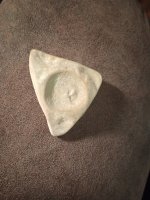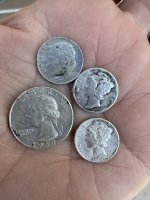bigscoop
Gold Member
- Jun 4, 2010
- 13,373
- 8,689
- Detector(s) used
- Older blue Excal with full mods, Equinox 800.
- Primary Interest:
- All Treasure Hunting
During the effected period in question, 1817 through 1821, and beyond, all of the major powers were focused on rebuilding their infrastructures. “Nobody Wanted War In Doing So.” The only way around this was by seeking trade agreements and systems of commerce within these different nations. Naturally, this required hard money, and lots of it. Bonds and securities, lines of credit, etc., all of them completely worthless with the hard money to back and support them. Problem was, the Second Bank of the United States was “deeply” in debt, its imports vastly overshadowing its exports. (Sound familiar?)
Anyway, the United States banking system was in such deep trouble there was serious question as to weather it could even survive. And yet the United States still sought those critical treaties to strengthen its infrastructure. Per example, at the conclusion of the Admas Onis Treaty the US was responsible for 5 million in spoliation fees, 5 million they clearly didn't have, the issuing of more bonds and securities out of the question because they couldn't back them up, their ratio of hard money to back their mounting debt being something like only 10% with only 2 million in hard money sitting in the bank, to back 25 million in debt looming large on the horizon. It was critical that the US gain Florida and it also badly needed those clear boundaries in the west. Given their upside down financial situation and mounting debt how could they even think to agreeing to another 5 million in spoliation debts? All of which, by the way, being satisfied per the agreement.
It's interesting to note that all five of these men, “Marshall, Jackson, Clay, Coles, Witcher” played pivotal roles in two hot topics of the time, that being the Second Bank of the United States and slavery, the later providing a huge source of revenue. Slavery didn't just become an issue in just those years leading up to the Civil War, fact is slavery had been at issue for many, many years in the US.
The emancipation of slavery is an interesting issue to explore in relation to our current mystery, the fact being that it mattered little when that emancipation came as it is certain to have driven the same wedge of war between the states had it occurred fifty-years earlier, which it very well could have. Even in the early 1800's there were free slave states in the north and their advocates were extremely busy to spread that same emancipation. Lincoln first explored the subject when he was just a young lawyer and butting political hope. “Coles” had been desiring to free his slaves while still under the tutelage of some of the country's most influential southern slave owning politicians, including Jefferson. In fact Coles even tried to get some of them to free their slaves, this all going on long before the outbreak of the Civil War. In truth, the only thing that kept slavery alive for so long was the financial weakness of the country during those earlier years and those early expansion debates and concerns in the new west. Otherwise it is very possible the Civil War could have taken place many years prior.
So there is a lot to consider in our current little mystery that could possibly come into play in the explaining of the story. It's up to us to look into them or not. Could be the true answer to our mystery rest somewhere we have yet to investigate?
Anyway, the United States banking system was in such deep trouble there was serious question as to weather it could even survive. And yet the United States still sought those critical treaties to strengthen its infrastructure. Per example, at the conclusion of the Admas Onis Treaty the US was responsible for 5 million in spoliation fees, 5 million they clearly didn't have, the issuing of more bonds and securities out of the question because they couldn't back them up, their ratio of hard money to back their mounting debt being something like only 10% with only 2 million in hard money sitting in the bank, to back 25 million in debt looming large on the horizon. It was critical that the US gain Florida and it also badly needed those clear boundaries in the west. Given their upside down financial situation and mounting debt how could they even think to agreeing to another 5 million in spoliation debts? All of which, by the way, being satisfied per the agreement.
It's interesting to note that all five of these men, “Marshall, Jackson, Clay, Coles, Witcher” played pivotal roles in two hot topics of the time, that being the Second Bank of the United States and slavery, the later providing a huge source of revenue. Slavery didn't just become an issue in just those years leading up to the Civil War, fact is slavery had been at issue for many, many years in the US.
The emancipation of slavery is an interesting issue to explore in relation to our current mystery, the fact being that it mattered little when that emancipation came as it is certain to have driven the same wedge of war between the states had it occurred fifty-years earlier, which it very well could have. Even in the early 1800's there were free slave states in the north and their advocates were extremely busy to spread that same emancipation. Lincoln first explored the subject when he was just a young lawyer and butting political hope. “Coles” had been desiring to free his slaves while still under the tutelage of some of the country's most influential southern slave owning politicians, including Jefferson. In fact Coles even tried to get some of them to free their slaves, this all going on long before the outbreak of the Civil War. In truth, the only thing that kept slavery alive for so long was the financial weakness of the country during those earlier years and those early expansion debates and concerns in the new west. Otherwise it is very possible the Civil War could have taken place many years prior.
So there is a lot to consider in our current little mystery that could possibly come into play in the explaining of the story. It's up to us to look into them or not. Could be the true answer to our mystery rest somewhere we have yet to investigate?







